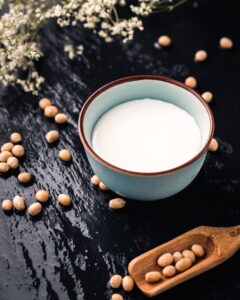Dear Coach: I've heard that we should not eat soy because of the estrogen raising our cancer risk, and yet I notice that you use tofu in some of your recipes. Is soy harmful or not? Janet
Dear Janet: Thanks for your question about soy. It's one of the most asked questions I hear during my cooking demos whenever I make a tofu-based chocolate pudding, or a marinated tofu stir fry. Much confusion exists around this topic, and has for many years.
There is certainly an anti-soy crowd that floats around the internet, and the soybean has been blamed for everything from the promotion of breast and prostate cancer, to early puberty, to thyroid disorders. Let me explain which soy foods are healthful and which should be avoided; but first let’s look at why soy gets a bad rap.
The Estrogen in Soy
Soybeans and other legumes contain isoflavones, which is a phytoestrogen (or plant estrogen). The reason phytoestrogens are called such is because their molecular makeup is similar to that of estradiol, a major hormone in women.
Erroneous conclusions have been made that soy foods will, therefore, elevate estrogen levels and increase the risk of cancers; however, the same conclusions are not made against other isoflavone-containing legumes. Soy has been singled out.
Phytoestrogens do bind to estrogen receptors in the body, but they're almost a thousand times weaker than human estradiol. However, this attachment to estrogen receptors has a protective effect because it blocks the attachment of stronger human estrogen, which is known to increase the risk of certain cancers.
Unlike human estrogen, phytoestrogens don't accumulate in the body; they pass through within a couple of hours. Eating soy foods does NOT elevate the levels of estrogen in the body.
What does elevate estrogen is the consumption of dairy (responsible for 60%-70% of dietary estrogen), animal protein and fat, alcohol consumption, lack of dietary fiber, carrying too much body fat, and lack of exercise. Anyone concerned with keeping estrogen levels in a protective range should be paying attention to these issues, not the avoidance of the soybean.
What Does the Cancer Research Say?
What does the research say? We have an abundance of credible evidence demonstrating the health benefits of whole soy foods, which continually supports the stance that whole soy foods are beneficial, even in women with breast cancer. A 2011 study presented at the American Association for Cancer Research reported that in a study of over 16,000 women, those who consumed soy had a 15% reduced risk of recurrence of breast cancer. The researchers stated that the concerns about the detrimental effects of soy are not observed in the populations studied.
Another study published in the Journal of the American Medical Association (the Shanghai Breast Cancer Survival Study), which followed 5042 breast cancer survivors for four years, revealed that women who consumed the most soy protein had a 32% lower risk of cancer recurrence and a 29% lower risk of death when compared to those with the lowest intake.
This was true for both estrogen receptor positive and negative breast cancers, as well as for women who did and did not take Tamoxifen. The researchers concluded that moderate soy food intake is safe and potentially beneficial for women with breast cancer.
Which Soy to Include, and Which to Avoid
Soy foods should be consumed in their WHOLE state and as minimally processed as possible (soymilk, tofu, edamame, miso, and tempeh). I always recommend purchasing only organic, or at least non-GMO soy foods. Use a little soy milk on your oatmeal, include some marinated tofu in a stir fry, try a tofu scramble for breakfast, snack on some edamame, or try an occasional tofu-based pudding..
The foods to be avoided contain Isolated Soy Protein. The bean's protein is extracted and included in many processed foods, such as fake burgers, tofu hot dogs, protein powders, energy bars, snack bars, cereals, bread, fruit juices, and many junk foods. Isolated soy protein is linked to several health problems and is known to promote inflammation and increase IGF-1 growth hormones which promote cancer initiation.
Who Shouldn't Eat Soy?
Anyone who is allergic or sensitive to soy, of course should not consume it. Also, for those with thyroid issues or taking thyroid medication, Dr. Greger advises to limit your soy consumption to 3-5 servings a day. Check out his video on the subject here.
The Bottom Line:
Soy is not a cure-all for every disease, nor is it a poison. It's merely a bean.
If you like soy foods, there is no need to restrict them because of health concerns. Enjoy them in their whole forms as part of a well-balanced, plant-structured diet. The totality of your diet matters most. If you don't like soy foods, there's no need to consume them.
Chocolate Tofu Pudding
1 pound soft silken tofu (organic)
2 TBS cocoa powder
½ cup maple syrup
1 tsp. vanilla
Blend until completely smooth. Chill before serving.
To learn more about foods that lead to normal weight AND optimal health, check out my free training class here.
